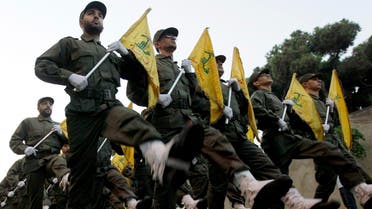Hezbollah could be a fatal ally for future Lebanese presidential candidates
In the murky world of Lebanese politics it is sometimes difficult to find rhyme or reason. But it is increasingly evident that the name of the game in Beirut today is an aggressive early bid for the Lebanese presidency.
The few apparent candidates are fully aware of the importance of local alliances, but also realize that local players are eventually swayed by their regional sponsors and allies. Candidates who are quick to dismiss the influence of the United States in the selection of Lebanese presidents do so at their own peril. The leading candidates realize that a newly resurgent and assertive US policy to contain Iran, Hezbollah, and Syria will cast a long shadow over the next presidential election.
Arab rapprochement with the Syrian regime seemed initially to have benefitted the pro-Syrian candidate Suleiman Franjieh. However, his chances have faltered with the hardening of the US position and the European Union’s intense hostility towards Syrian President Bashar al Assad, a close friend of Franjieh.
The current leading contender is the Lebanese foreign minister, Gibran Bassil, President Michel Aoun’s son-in-law and protégé. Both Bassil and Aoun are political allies of Hezbollah. Given the escalating tensions between the US and Iran, it is unlikely that yet another pro-Hezbollah candidate for the Lebanese presidency will be tolerated by Washington once Aoun’s term is over in 2022. The statements from US Secretary of State Mike Pompeo against Hezbollah as well as Washington’s cold diplomatic attitude toward Bassil are clear indications that the US would not endorse a candidate allied with Hezbollah. Certainly, Hezbollah’s support for a candidate is important but it falls short against a major US objection. This time around Bassil knows he cannot have his cake and eat it too.
The alliance between Hezbollah and Bassil’s Free Patriotic Movement was strained in the parliamentary elections of May 2018. Bassil’s presidential aspirations seem to have exacerbated the situation. The leak of the minutes of meetings of Lebanese officials in Washington last month by the pro-Iran Al-Akhbar newspaper was followed by a smear campaign against Bassil. Bassil retaliated by targeting diplomats in the Lebanese foreign ministry close to the newspaper and, therefore, indirectly to Iran. Already on poor terms with Parliamentary Speaker Nabih Berri, Bassil was now confronting more than one of Hezbollah’s allies. In a sudden move, the FPM expelled 700 members of the Movement in the Bekaa Valley, all of them Shiites, because of alleged electoral irregularities. In a similar vein, Bassil has shown no interest in visiting Damascus in his capacity as foreign minister and has on numerous occasion voiced disparaging remarks toward the Syrian regime, even proposing a monument commemorating Syria’s withdrawal from Lebanon in 2005.
Despite intense lobbying by the FPM in Washington, the current administration remains lukewarm toward Bassil, and will probably remain so should President Donald Trump be re-elected. With that in mind, an effort to court the Democrats may shed some light on the warm welcome afforded to Congressman Eliot Engel during his recent visit to Lebanon. Significantly, Bassil hosted Engel, the chairman of the House Foreign Affairs Committee and a staunch supporter of Israel, in his hometown of Batroun on May 25, the same day that Hezbollah was celebrating the 19th anniversary of Israel’s withdrawal from south Lebanon. Furthermore, Engel played a key role in passing anti-Syria legislation in 2004.
Recently, Senator Tim Kaine, the running mate of Hillary Clinton, was hosted at the Lebanese Embassy in Washington. In an op-ed in the Washington Examiner, a close friend of the Lebanese defense minister and FPM official, Elias Bousaab, minimized the influence of Hezbollah in the Lebanese cabinet, claiming the party has only one minister in government. In fact it has two directly and control over a third.
All this points to a concerted effort by the FPM to court US Democrats by understating its strategic alliance with Hezbollah in order to better Bassil’s chances for the presidency should a Democratic candidate win the White House in 2020.
Nevertheless, back home in Lebanon, FPM media and officials dutifully continue their onslaught on US policy as well as defending the legitimacy of Hezbollah’s weapons.
In contrast to the FPM ploy, the current Republican administration seems more at ease with General Joseph Aoun, the Lebanese army commander, who is fast becoming a credible presidential candidate in Lebanon and abroad. The same administration in Washington that shunned Foreign Minister Bassil received Army Commander Aoun with open arms, promising continuous support for the Lebanese army and the general. Notably, the Lebanese embassy in Washington, which answers to the foreign ministry, did not host a customary reception for Aoun during his last visit to the US capital, in what many are interpreting as a snub.
Attempts to discredit the US assistance program to the Lebanese army by Neocons in the US and Iran’s allies in Lebanon (albeit for different reasons) fell on deaf ears in no small part because of the high esteem the Trump administration holds for Aoun.
In Beirut, another battle was raging over the defense budget and proposed cuts in salaries and benefits of military personnel. This pitted Bassil and his FPM ally Bousaab, who favored the cuts, against the military establishment which vented its resentment through street protests by army veterans. In an unusual move, General Aoun publicly weighed in on the spat by delivering a few disparaging remarks against disloyal politicians.
Although this parliament was elected a little more than a year ago, the public is quickly losing faith in the current political order’s ability to deliver on the economy and on fighting corruption. Traditional political alliances are either under duress or have come undone. The alliance between the FPM and Hezbollah is no exception. An assertive US policy against Iran and its allies may have accelerated this process by rendering any alliance or affiliation with Hezbollah as too high a cost to bear. The FPM realizes that such an affiliation is hazardous and will lead to US alienation and possibly sanctions. Prime Minister Saad Hariri’s working relationship with President Aoun is also tethered. That Druze leader Walid Jumblatt has publicly distanced himself from Hezbollah is a tell-tale sign of this trend.
President Aoun cemented a political pact with Hezbollah in 2006 in order to improve his chances of winning the coveted presidency, a plan that ultimately bore fruit when he was elected head of state in November 2016. Ironically, Hezbollah may well be a major player in the next presidential elections, but this time in a negative manner for potential candidates.
The battleground for the presidency is taking shape in Washington as well as Beirut. Bassil may discover that while it may be dangerous to be Hezbollah’s opponent, it could prove fatal to be its ally.
_________________________________
Basem Shabb is a former member of the Lebanese parliament.
-

Secondary sanctions would put Tehran and Hezbollah in an economic chokehold
The Trump administration’s restored Iran sanctions have started strong and ... Middle East Opinion -

Pompeo’s warnings to Lebanon about Hezbollah will be the last straw
Over the last week, Lebanon was immersed in Mike Pompeo’s visit to Beirut, ... Middle East Opinion

